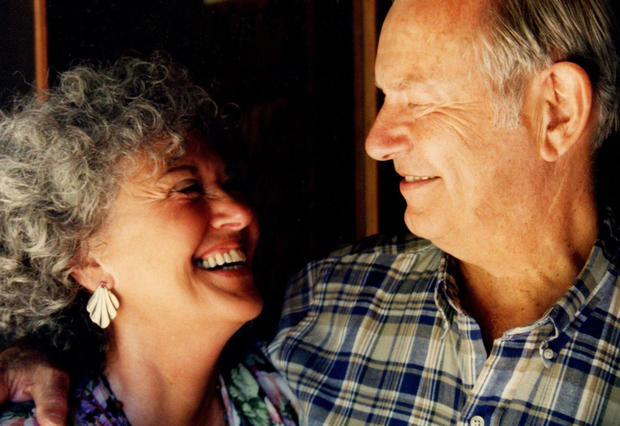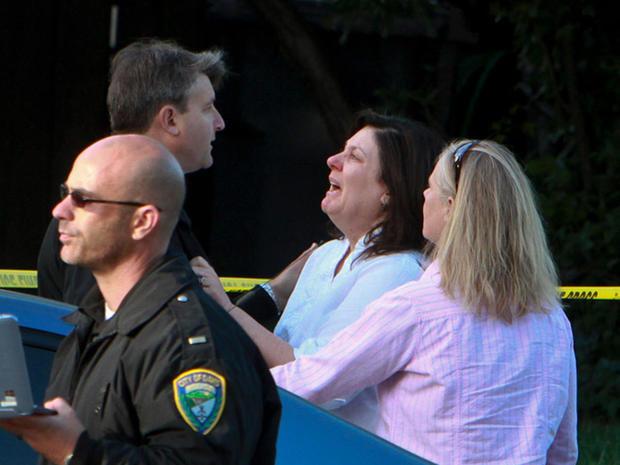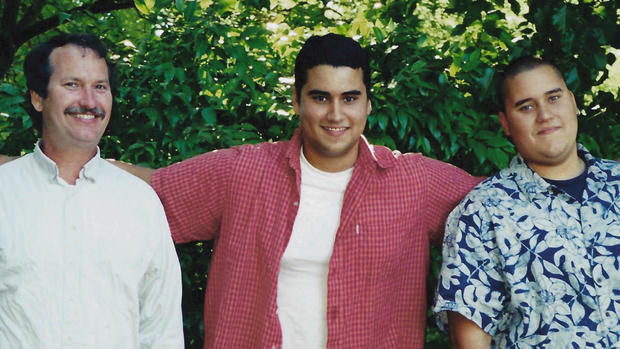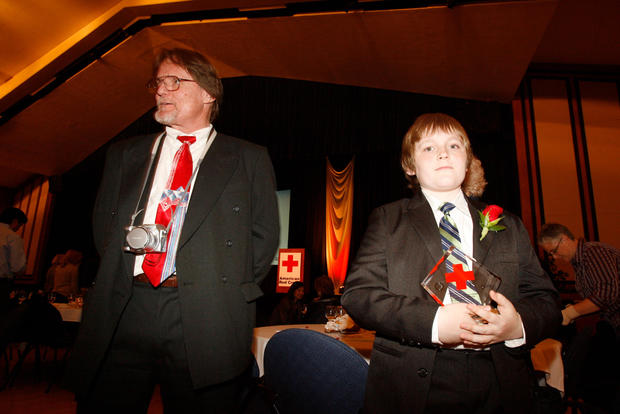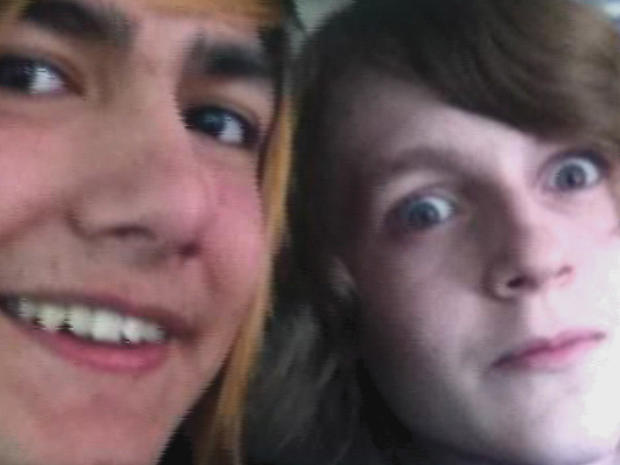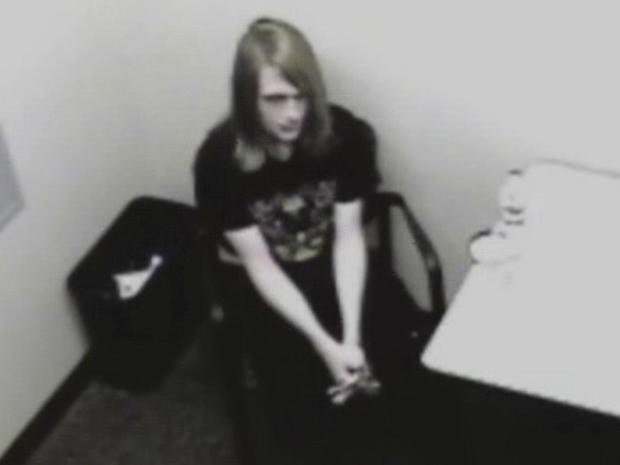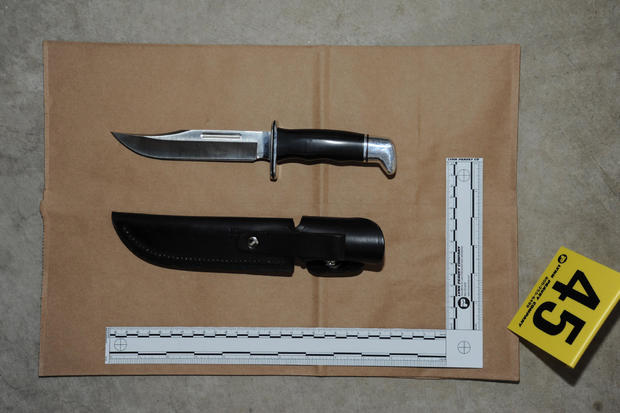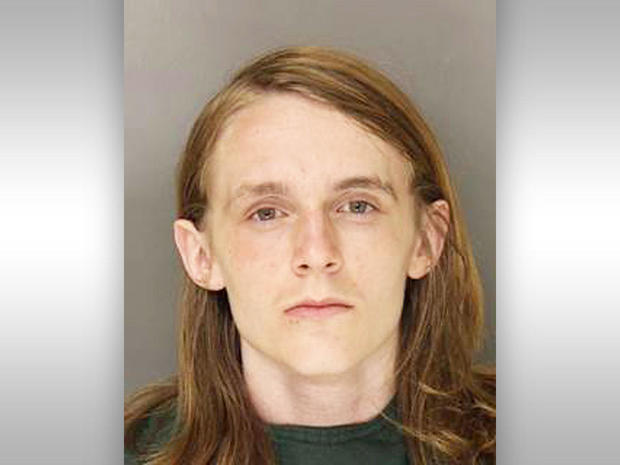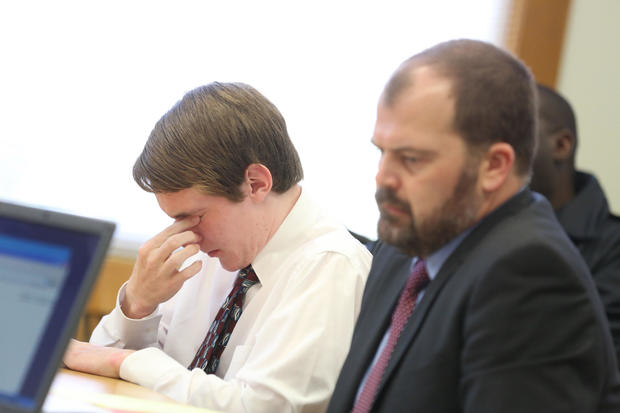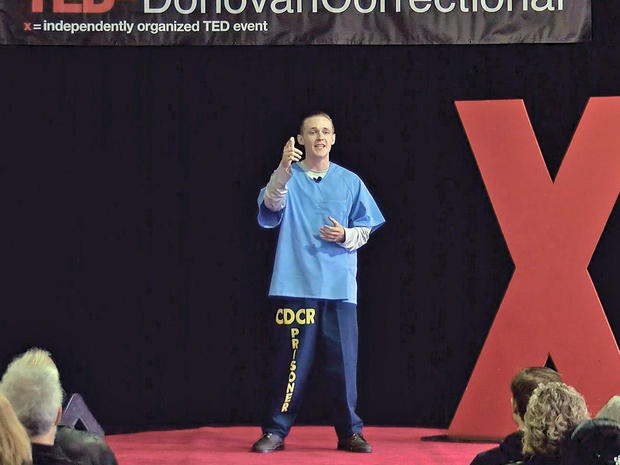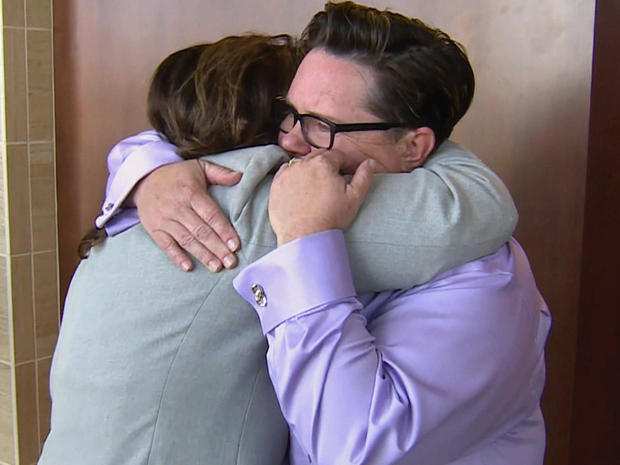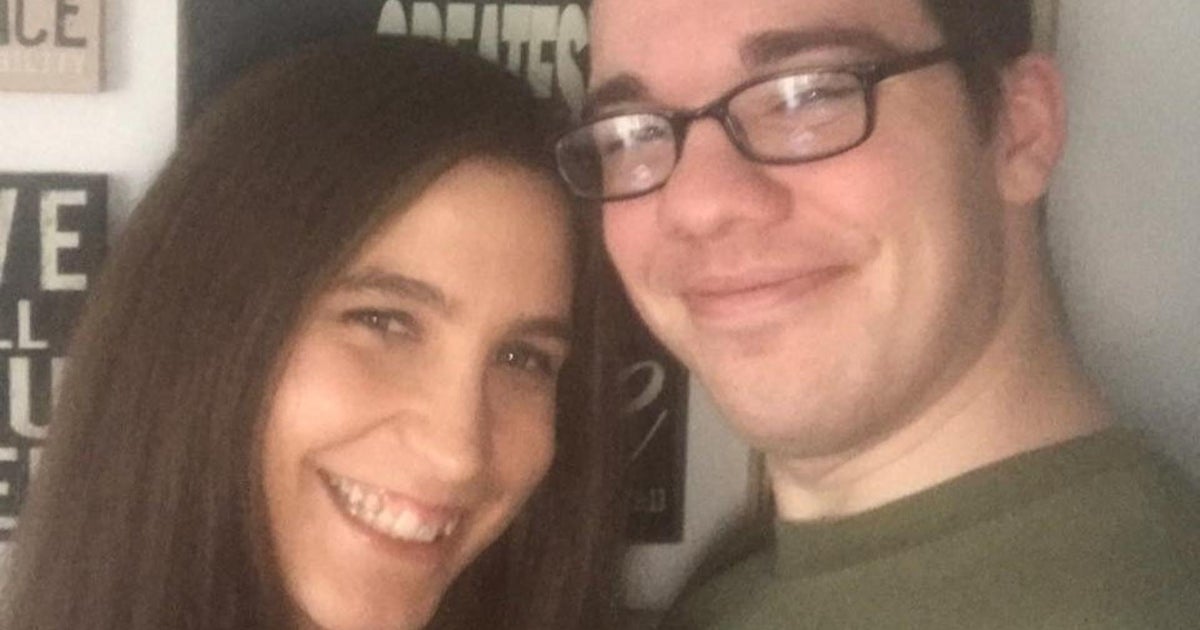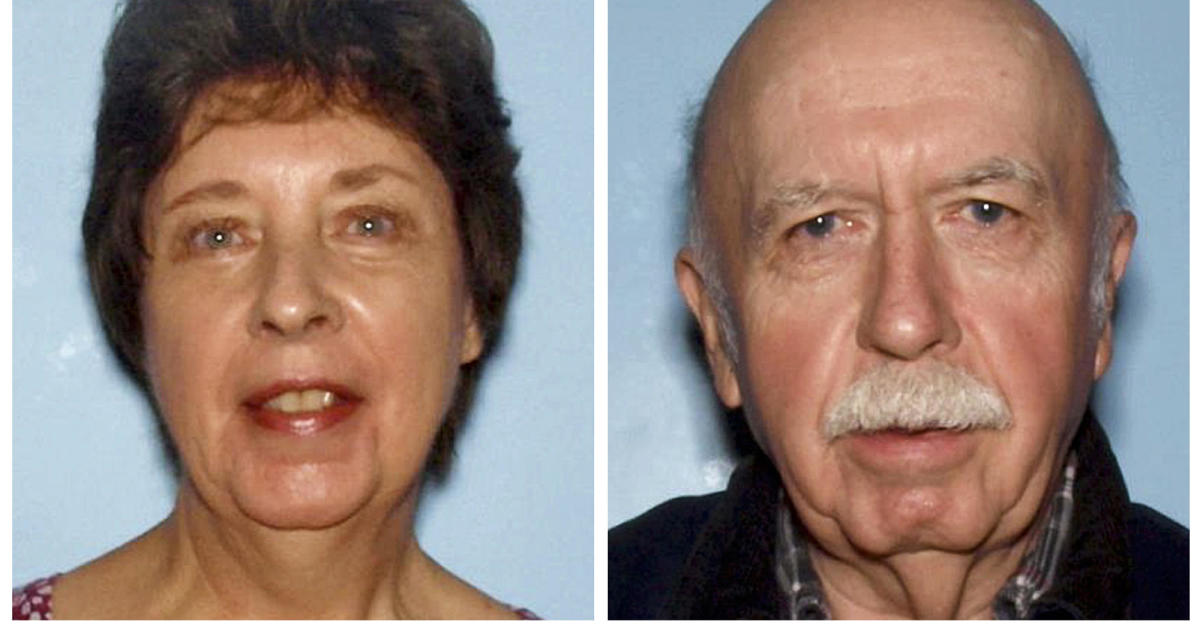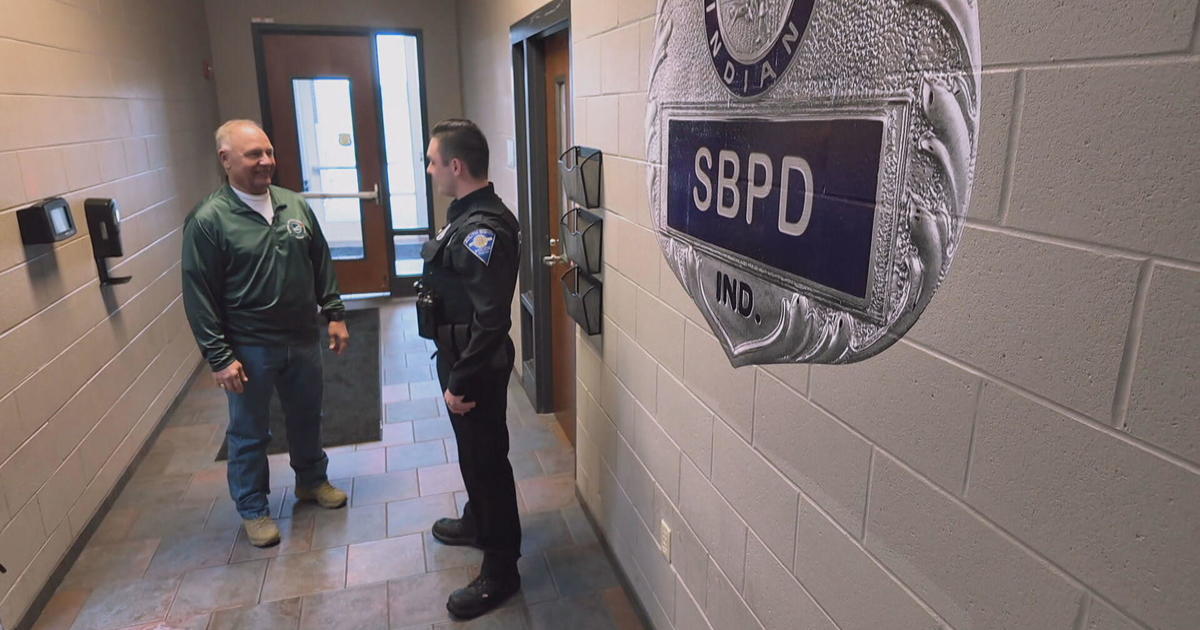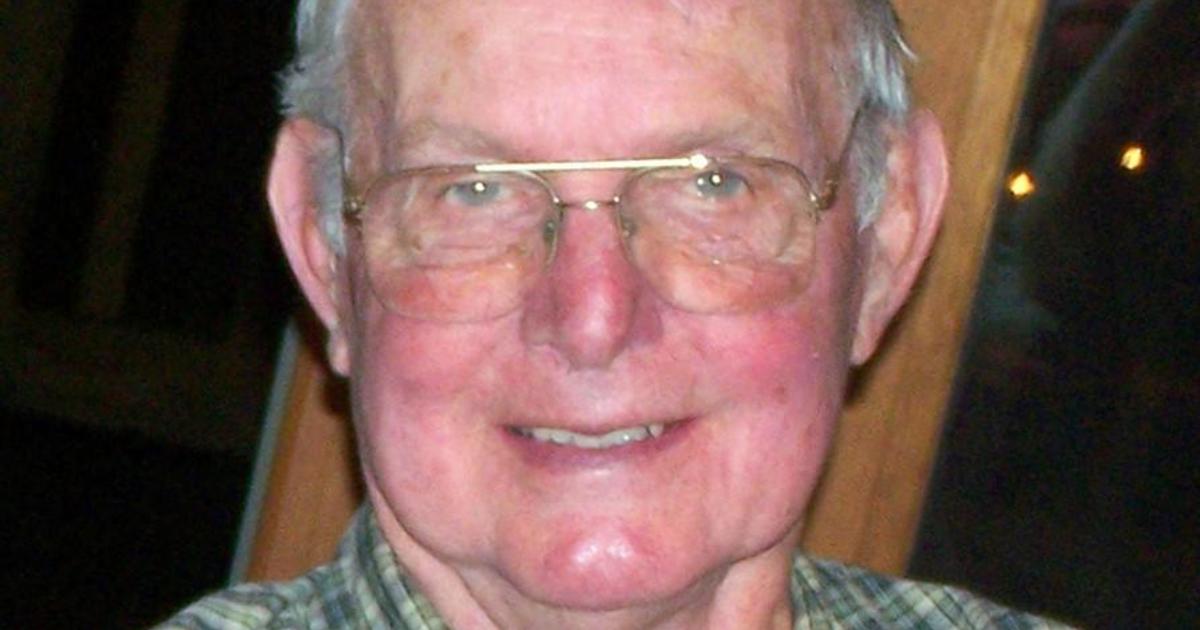Could a new California law free a teen killer convicted as an adult for a brutal double homicide?
Produced by Judy Rybak and Stephanie Slifer
[This story originally aired on Feb. 23. It was updated on June 15.]
Six years ago, someone savagely stabbed to death Chip Northup, 87, and Claudia Maupin, 76, as they slept inside their Davis, California, home. Police found no physical evidence and investigators thought they might have some challenges finding the killer.
"It was the most horrific, depraved murder I've ever seen as the district attorney in this county," Yolo County, California, D.A Jeff Reisig tells " "48 Hours"' correspondent Erin Moriarty. "I was certain they were going to find some forensic evidence in the crime scene. A finger print, DNA, shoe prints, something, and they found nothing."
However, two months after the April 14, 2013 murders, police got an unexpected tip from a teenager saying his best friend, then 15-year-old Daniel Marsh, had bragged about the murders.
In an interview with police, Daniel told them what happened. Prosecutors charged him as an adult. Experts diagnosed Daniel as a psychopath, who killed the couple for pleasure. He was tried as an adult, convicted and sentenced to 52 years to life.
What seemed to be a closed case was far from it.
Four years after Daniel's conviction, a new California law has thrown his sentence into jeopardy. Now, his lawyers are arguing that Daniel should be retried as a juvenile. If successful Marsh, now 21, would be retried and resentenced in juvenile court, where the maximum sentence runs only to age 25.
Will Marsh eventually serve out his sentence or will he get out early because of the new law?
A SAVAGE DOUBLE MURDER
Take a ride through Davis, California, and you'll see why the college town has been named one of this country's best places to live and why Claudia Maupin moved here.
Victoria Hurd | Claudia Maupin's daughter: She loved living in college communities. So, she loved being around … all the young people and all the new ideas.
Victoria Hurd says Davis was one of California's safest cities when her mother first arrived in 1995 and started attending services at a Unitarian church, hoping to meet her third husband.
Victoria Hurd: She had been a spiritual traveler through many different religions and denominations, and she just had fallen in love with the Unitarian church. So, she said to me, "My husband is at the Unitarian church."
Claudia soon met Oliver "Chip" Northup, one of the church's founders. Well known for his social activism, Northup was a World War II veteran and a prominent attorney. Like Claudia, Chip had been married several times. But according to his firstborn daughter Mary, the couple's families blended easily.
Mary Northup | Chip Northup's daughter: Claudia had that ability to make every person that she spent time with feel that special so that they would come away and say, "She's my best friend."
Both Chip and Claudia's families were thrilled when the couple decided to marry in 1996.
Erin Moriarty: I would think then the church was filled.
Sarah Rice | Claudia Maupin's granddaughter: Filled, it was packed.
Victoria Hurd: It was filled.
Erin Moriarty: Did you two ever worry about their safety?
Victoria Hurd: No. Absolutely not.
Sarah Rice: No.
Victoria Hurd: They had an idyllic life. … they had so many loved ones around them. They had so many great neighbors. … They lived in Davis!
Claudia and Chip had been married for 17 years when, on the night of Saturday, April 13, 2013, they said goodnight to each other for the very last time.
The next morning at church, the couple was noticeably absent.
Mary Northup: I called. And I called his number, and I called Claudia's number and they both went to voicemail.
Chip was in a local folk band. When he didn't show up for a gig that afternoon, Chip's son Robert and a grandson paid a visit to Chip and Claudia's condo.
Robert Northup: …we rang the doorbell and no one answered. … everything I saw indicated they were out of town.
Robert had a key but chose not to use it. Later that evening, Claudia's stepdaughter Laura also rang the bell. When there was no answer, she went around back and saw an open window with its screen slashed. One look through the bedroom window and Laura knew that something awful had happened.
Robert Northup: She saw blood stains … She saw enough that she made a call to get other people over there.
Victoria Hurd: The next morning … there's 12 missed calls from my sister. … She said … "there's been a break in and there are two dead bodies in the house" … and then I lost it. My brain couldn't process that.
Victoria had to call her daughter Sarah and break the news. But all that police would share is that Claudia and Chip had been stabbed "multiple times."
Sarah Rice: I was like, "Multiple? What does multiple mean? Is there a certain number that we should know?" And the coroner said, "All I can tell you is that multiple means more than 12."
It would be just over a year before they learned that Chip had 61 stab wounds; Claudia had 67.
Sarah Rice [crying]: That's 128 stab wounds. … How does anybody even have the strength to do that. And why would somebody want to do that?
But that wasn't even the worst of it. Davis Police Lieutenant Paul Doroshov says the killer had experimented with the bodies and had placed a cellphone into Claudia's abdomen and a drinking glass into Chip's stomach.
Lt. Paul Doroshov | City of Davis Police Dept.: We thought that, well maybe there's some type of meaning to it but … We were trying to latch onto every detail we could to help us with this case.
But there was little to latch onto. There was no physical evidence -- not even a shoe print.
FBI Special Agent Chris Campion: The place isn't ransacked. There's no valuables missing. … Clearly this is not a burglary that was interrupted.
Erin Moriarty: How soon did you hear that there was no evidence, that this looked like the perfect crime?
Sarah Rice: I think we were two months into it.
FBI Special Agent Chris Campion: We brought 25 FBI agents, experienced task force officers from other areas, and we really flooded that neighborhood.
Deputy D.A. Amanda Zambor | Yolo County, Calif: We thought it had to be somebody close to Chip and Claudia, something that happened where there was a disagreement some family dispute because it did appear to be so personal.
Former Special Agent Chris Campion says that even the FBI profilers were stumped, unsure if they were dealing with one killer or more or if the open window was even the point of entry.
Mary Northup: I think they had at this point developed a story that somebody with a key had done it and that they'd cut this hole in the screen to divert attention.
Erin Moriarty: To make it look like someone had broken in.
Mary Northup: So that if you come up with that theory, then you have to look at family members.
Sarah Rice: FBI agents had called us all individually, and you could tell that they were doing everything in their power to get answers, but there was nothing.
Until they got to Chip's son Robert, and his two sons Oliver and Tony. Oliver suffers from schizophrenia.
Robert Northup: We lived in the same town not very far away, it would not have been logistically difficult for one of us to have gone over there and done that.
Robert also had that key to the condo.
Erin Moriarty: Oliver … did you know that the police were looking at you and your brother?
Oliver Northup | Chip Northup's grandson: Well, yeah, they asked us to come in for questioning and I agreed.
Robert Northup: That first day was about eight hours of questioning, the next day was another six. It was just day after day, long hours of questioning.
Oliver Northup: Mm-hmm [affirms].
Robert Northup: And I kept thinking, "Well, my father would want us to cooperate in every way."
They were questioned without a lawyer.
Erin Moriarty: Were you scared?
Oliver Northup: Very nervous.
And with good reason. When police searched Robert's home, they found the kind of evidence that gets people convicted. First, carpeting that had been steam-cleaned on the day of the murders.
Robert Northup: Yeah, it was bad timing. I didn't anticipate that that would be the same weekend my father got murdered. … It looked like I was covering up, removing evidence.
Investigators also found a very disturbing drawing by Tony. It was the image of a man with a knife, standing over two children in a bed.
Mary Northup: The only thing I can say is that, the three of them -- they're not violent. … If something had clicked and turned them violent it would never have been for these two people.
Erin Moriarty: Did either one of you think that was possible?
Sarah Rice: No. Never.
Victoria Hurd: Not for a second, because Chip spent so much time with those boys. … those boys adored him.
The family spent thousands of dollars hiring an attorney for Tony and repairing all the damage done by investigators.
Robert Northup: Then they cut out the carpet, they took out some of the plumbing fixtures looking for things that might have been put in the drain … and they also took out a little bit of flooring.
The Northup family, Tony, in particular, felt persecuted. And even though his name was eventually cleared, Tony still felt that neighbors had their doubts about him. Three years after the murders, he would commit suicide. Oliver got a tattoo in memory of him.
Erin Moriarty: You've gone through a lot haven't you?
Oliver Northup: Yeah. I think so.
Two months after the murders, police got this call:
911 OPERATOR: Davis Police Emergency.
ALVARO GARIBAY: Oh yeah, can this be anonymous?
911 OPERATOR: What are you reporting?
ALVARO GARIBAY: Uh, double homicide?
D.A. Jeff Reisig: When this tip came in, it seemed really strange. It didn't seem to match what any of us had thought.
ALVARO GARIBAY: The reason I want to remain anonymous is cause if my mom finds out she will send me to military school.
CORPORAL ALLEN: What are you calling to report, sir?
ALVARO GARIBAY: Um, the double homicide that happened in April this year.
CORPORAL ALLEN: What can you tell me about that?
ALVARO GARIBAY: Everything actually.
A 17-year-old Davis High School student called to say he knew who killed "that couple" -- it was his best friend.
ALVARO GARIBAY: Daniel Marsh.
CORPORAL ALLEN: Daniel Marsh?
ALVARO GARIBAY: Yeah, Daniel Marsh or Dan Marsh.
Daniel Marsh was a name that Yolo County District Attorney Jeff Reisig had heard years earlier, but not in connection with a crime.
Erin Moriarty: At the time, he was viewed as a young hero. He had saved his father's life.
D.A. Jeff Reisig: Right. He was the hero of the day.
At 10, Daniel was given an American Red Cross Heroes Award after using CPR to save his father from a heart attack.
D.A. Jeff Reisig: I remember thinking at that time, this kid's going places.
It didn't seem possible. Could that young hero really have grown up to be the vicious killer investigators were hunting for?
A 15-YEAR-OLD KILLER?
Erin Moriarty: When you first saw Daniel Marsh what was your reaction?
D.A. Jeff Reisig: Total shock that a boy was responsible for these crimes.
No one imagined, says District Attorney Jeff Reisig, that the depraved killer of Chip Northrup and his wife Claudia might turn out to be a 15-year-old teenager. And certainly not this teenager who had once saved his father Bill Marsh's life.
At the time of the murders, Bill Marsh lived next door to Claudia and Chip.
Bill Marsh: And I chose that location because it was in walking distance of their mother's.
That's where Daniel lived -- at his mother Sherri's house -- and it's where he was staying on the night of the murders. The day the bodies were discovered, Bill Marsh was home recovering from back surgery when police showed up at his door.
Bill Marsh: Knock, knock, knock on the door, "Hi, I'm so and so, the police. Do you know Chip and his wife?" I said, "No, I don't know anybody. I just moved in."
About two weeks after the murders, Bill Marsh says he could no longer afford the rent and moved out.
Special Agent Chris Campion: I remember very vividly one of the neighbors came up and said, "Hey, I don't know if this is relevant or not, but several days after the murder, the guy in that house … moved out." …And we didn't think much about it at that time.
And investigators might never have focused on Daniel Marsh if not for that phone call from 17-year-old Alvaro Garibay two months after the crime, accusing his best friend of murder:
ALVARO GARIBAY [Police interview]: Well, he talked about killing people a lot. I didn't really think seriously … he'll kill someone.
Erin Moriarty: So, help me understand ... this was your best friend.
Alvaro Garibay: I know. I don't know if I can help you understand that [laughs].
Garibay says he laughs when nervous. But back then, investigators took him very seriously. He seemed to know way too much about the murders -- gory details known only to a handful of investigators and the killer.
Garibay was interviewed twice, leaving investigators wondering if he was the killer:
ALVARO GARIBAY: He cut both of them open and just to see the insides or something. And then he went to the woman I think, and he wanted to know what an eye looked like. So he tried taking it out with a knife but he said it was really hard so he couldn't do it.
DET. ARIEL PINEDA: Why did it take you until now to speak to us?
ALVARO GARIBAY: Because, I don't know, actually. I was afraid.
Garibay says he finally came forward because Daniel had threatened to kill again.
Erin Moriarty: Do you think your life was at risk?
Alvaro Garibay: Oh, yeah -- mine, my family's, my friends.
On June 17, 2013, investigators asked the high school resource officer to bring Daniel Marsh in for questioning and he seemed more than happy to talk. It was now up to Davis Detective Ariel Pineda and FBI Special Agent Chris Campion to get to the truth.
Erin Moriarty: Did he seem worried about talking to you at all?
Special Agent Chris Campion: No. … Certainly not at the beginning. … I think he figured he could talk his way through it.
SPECIAL AGENT CAMPION: What do you know, Dan?
DANIEL MARSH: I just know that somebody broke into this old couple's house and stabbed them, killed them.
Investigators would spend the next three hours learning all they could about Marsh, looking for a way in:
DANIEL MARSH: Uh, I was that loner kid, that you know, there's always that one outcast.
SPECIAL AGENT CAMPION: Dad and mom split when you were pretty young?
DANIEL MARSH: Yeah.
SPECIAL AGENT CAMPION: Wow, and then mom basically left, abandoned you, or your family …
DANIEL MARSH: Yeah, for like three or four months.
Marsh's mother ended her marriage after having an affair with a woman -- Daniel's kindergarten teacher -- which enraged the 10-year-old.
Alvaro Garibay: He hated her. He would tell me that, "I know this woman was involved in my parents' divorce. And I just want to, like, strangle her to death."
Marsh even tried taking his anger out on himself:
DANIEL MARSH: I used to like harm myself [points to his left forearm]
SPECIAL AGENT CAMPION: I see a scar or two there, yeah.
DANIEL MARSH: Yeah.
Special Agent Chris Campion: As near as I understood the cutting phenomenon, it was people who … just kind of have this flat, depressed kind of dark outlook on life, and the cutting actually brings … that sense of living.
Campion says Daniel Marsh was willing to do anything to feel something -- including starving himself:
DANIEL MARSH: All the pain and depression and anger just like -- I internalized it and I directed it towards myself.
Daniel was voluntarily committed to an eating disorder clinic for 25 days, and while his anorexia seems to have passed, Garibay says Marsh's anger continued to consume him.
Alvaro Garibay: He would tell me a lot about suicide.
Erin Moriarty: And how old were the two of you? When was that?
Alvaro Garibay: I think 14.
DANIEL MARSH: I attempted it four times in my life…
It seems there were several therapists and doctors who intervened, trying numerous medications. Then, in mid-December 2012, Daniel made a stunning admission, telling a school counselor that he fantasized about killing people.
Robert Northup: She was so concerned … they brought the police to the school.
Daniel was shortly hospitalized, but, upon release, things got worse.
Erin Moriarty: Did he talk about killing?
Alvaro Garibay: He, like, brought it up more, but … He was just, like … "I wish that person would die."
But in his police interview, Daniel was denying it all, including the murders of Claudia and Chip. Then, after 3 hours and 38 minutes of questioning, the façade finally began to crumble:
SPECIAL AGENT CAMPION: Why the heck would you just sit here and bold-faced lie to Ariel and me?
DANIEL MARSH: 'Cause I am - you guys are threatening me with f-----g …
SPECIAL AGENT CAMPION: With what, the truth?
DANIEL MARSH [emotional]: …getting arrested for two murders. I am so scared right now, of course I'm gonna do anything I can to try and say that I didn't do this.
Special Agent Chris Campion: That was the first sign that he was getting over that wall, that he was getting ready to talk to us about what really happened.
DANIEL MARSH: If you want to help me, then don't ruin my life. If anything, send me to the psychiatric hospital.
Erin Moriarty: But, Chris, were you really prepared for what he told you next?
Special Agent Chris Campion: Um, No.
DANIEL MARSH: Every time I look at someone, in my mind I see flashes of images of me killing them.
A FASCINATION WITH MURDER
For more than three hours, Daniel Marsh insisted he knew nothing about the murders of Claudia Maupin and Chip Northup. But he began to reveal more and more about himself to Agent Chris Campion:
DANIEL MARSH: When I was 10 I thought about and plotted about killing a woman that my mother left my father for.
SPECIAL AGENT CAMPION: What was your plan?
DANIEL MARSH: I was gonna slit her throat.
Daniel says that was when he began to fantasize about killing people. Eventually he became obsessed with something called "gore porn," and a website devoted to it.
Alvaro Garibay: I remember just like walking into his room. And he was like, "Dude, check this out." … and it's like literally people getting beheaded.
Erin Moriarty: And how did he react when he was watching those videos?
Alvaro Garibay: He just sat there. … I think he was, like, fascinated by it.
But it's one thing to be fascinated and another to actually take a life.
Alvaro Garibay: He strangled a cat in the street. And then I was like "Oh, OK. Well, why'd you do that?" And like, "Well, I just wanted to do. I just I hated that cat."
In the interview room, investigators still hadn't heard Daniel confess to killing Chip and Claudia, and pressed on:
SPECIAL AGENT CAMPION: When was the first time you started thinking about killing these people down the street?
DANIEL MARSH: Yeah, I really am f----d either way, aren't I? I didn't …
SPECIAL AGENT CAMPION: Did you start thinking about it?
DANIEL MARSH: I -- that night I just -- I couldn't take it anymore. I had to do it. I lost control.
There it was -- the opening that investigator Campion had been hoping for. Daniel admitted that he had been hunting for someone – anyone -- to kill that night when he came upon Chip and Claudia's open living room window:
DANIEL MARSH: I cut a hole in the screen … climbed in through the back … went to their bedroom, I opened the door, then I just kind of stood over their bed, watching them sleep for a few minutes.
DANIEL MARSH: My body was trembling. I was … nervous but excited and exhilarated. I was actually gonna do it, I was there, it was finally happening.
Without any outward emotion, Daniel described how he repeatedly stabbed Claudia and Chip.
What Daniel shares is graphic, but these disturbing details would become key evidence, in a family's battle for justice:
DANIEL MARSH: I cut open both of their torsos, you around here [points to two areas of his chest], and in the woman I put a phone inside of her and I put a cup inside the guy.
Daniel said it was all part of his plan to confuse investigators and get away with murder. He also taped the bottom of his shoes so he wouldn't leave prints and wore a ski mask and gloves so as not to leave behind DNA or fingerprints. But, hidden by Daniel in his mother's house, investigators found all the evidence they needed: bloody clothing and the knife used to kill Chip and Claudia.
SPECIAL AGENT CAMPION: Did you wash blood off of it or did um, it had to have been fairly covered.
DANIEL MARSH: I kept it as a souvenir.
A souvenir to forever remember how much he enjoyed taking two lives:
DANIEL MARSH: I'm not gonna lie. It felt amazing.
In fact, records show that Daniel was doing so much better in school, he was named student of the month after the high of the murders.
DANIEL MARSH: It was pure happiness, and adrenaline and dopamine, just all of it, rushing over me.
After Daniel made a full confession, Campion did something unusual:
SPECIAL AGENT CAMPION: You mentioned that pretty much everybody you meet you have thoughts about killing them and how you would kill them.
DANIEL MARSH: Yeah.
SPECIAL AGENT CAMPION: So how would you kill me?
DANIEL MARSH: Just a lot of ways. … Um, choking you to death with your tie.
SPECIAL AGENT CAMPION: Ok.
DANIEL MARSH: Uh, beating your face into the mirror until it broke and using the glass to cut your arteries, uh, gouging your eyes out and just smashing your face into the wall. Nothing personal.
Erin Moriarty: Nothing personal?
Special Agent Chris Campion: And I said I didn't take it personally because I didn't. … That's his fantasy life.
Erin Moriarty: I mean Chris, do you believe that Daniel Marsh was a serial killer in training?
Special Agent Chris Campion: Absolutely. Without a doubt … he actually talked about how he was going to take his next victim. He was lurking in the streets of Davis at night with a baseball bat intending to beat to death some poor passerby.
DANIEL MARSH: I don't feel sympathy for other people -- at all. Don't feel empathy for them.
D.A. Jeff Reisig: This was not the act of a broken child who had a rough life. This was the act of somebody who in my mind, is just evil.
Daniel Marsh was immediately arrested and charged with the murders of Chip Northup and Claudia Maupin.
Erin Moriarty: Was there any question whether he would be charged as an adult and be tried in an adult court?
D.A. Jeff Reisig: At the time, no, … because of the nature of the crime. He had to be tried in adult court.
With Marsh facing life in prison, two top public defenders were assigned to his case. Then, Marsh pleaded not guilty by reason of insanity -- something Chris Campion had anticipated.
Special Agent Chris Campion: That's why I'd spent some time with him … I wanted to make clear that he's not somebody who had had a break with reality, somebody who heard voices or had voices in his head telling him to do things.
SPECIAL AGENT CAMPION: Did you ever hear any voices talking to you?
DANIEL MARSH: No.
Special Agent Chris Campion: He wasn't anywhere close, in my opinion, to legally insane.
Even psychiatrist Dr. Matthew Soulier, who was hired by the defense, agreed that Daniel was sane. Even though when they met, Daniel threatened to kill him.
Dr. Matthew Soulier: I didn't find him to be insane. I found him to be mentally ill, but responsible for his crimes. …And … I think my understanding is that … they went ahead and continued to pursue a defense of insanity.
…without Soulier as their expert witness.
A year after the murders, Daniel Marsh went on trial. The defense argued that the anti-depressant drugs given to Daniel for his anorexia and suicide attempts had caused a temporary insanity.
Deputy D.A. Amanda Zambor: "Zoloft made me do it."
Deputy District Attorney Amanda Zambor wasn't having it.
Deputy D.A. Amanda Zambor: But when you actually looked at the medical records, he was having these thoughts and fantasies before he was ever on Zoloft.
Erin Moriarty: Bill, I know that you believe that a lot of your son's problems are connected to the medications he was taking.
Bill Marsh: Oh, yeah.
Erin Moriarty: But he had fantasies about killing before he started on the drugs. He killed animals before he started on these drugs.
Bill Marsh: Yeah. See, I don't know that that's true. … There's a whole series of confessions by people who have been on these drugs that have false memories. They believe certain things happened that never did.
The question now was would the jury agree? Would they find Daniel Marsh insane and decide a psychiatric hospital was more appropriate than prison?
Erin Moriarty: Were you more nervous about that?
Deputy D.A. Amanda Zambor: Yes. … the immediate thought is that somebody would have to be insane to do something like this.
A SECOND CHANCE?
On Sept. 26, 2014, the jury deliberated for just under two hours before finding Daniel Marsh guilty of first-degree murder. They also found Marsh sane, allowing the judge to sentence him to the maximum: 52 years-to-life.
VICTORIA HURD [to reporters]: We are very, very pleased with the verdict. For me, we feel justice.
Victoria Hurd: We all exhaled. I mean that was great.
Erin Moriarty: But it wasn't over yet, was it?
Victoria Hurd: It wasn't over, Erin. No, it wasn't over.
That's because two years later, California voters passed Prop 57, and gave Daniel Marsh a second chance.
You'll recall that in this case, District Attorney Reisig made the decision to try Daniel Marsh as an adult. But under the new law, that decision would now have to be made by a juvenile court judge.
D.A. Jeff Reisig: How do you call a family that sat through an entire trial. … How do you call them up and say, "Sorry, you have to come back because there's a chance he may end up being pushed back to juvenile court where he would be potentially released at the age of 25."
A judge would now listen to evidence and decide if Daniel Marsh should have been tried as a juvenile. If so, the state might be forced to set Marsh free on his 25th birthday.
Deputy D.A. Amanda Zambor: He's 21 now. So in about three-and-a-half, four years, he would be out with no supervision. No parole. … He would just be free.
Victoria Hurd: I went into PTSD. …And I said, "I can't do this … I can't do this. I'm moving forward."
But before a hearing date could even be set, a striking video appeared online.
DANIEL MARSH | TEDX TALKS: Hurt people, hurt people…
Through a prison rehabilitation program, Daniel Marsh took center stage in his very own Tedx Talks, declaring that he is reformed, and deserves a second chance.
DANIEL MARSH | TEDx TALKS: I came to realize that there are no such things as evil people in this world. Only damaged people.
Victoria Hurd: And I'm watching it like a deer in the headlights, you know, I can't pull my eyes away.
DANIEL MARSH | TEDx TALKS: I kept allowing myself to be trapped by my emotions and to be disconnected.
Victoria Hurd: "How dare you," was all I could say to the screen.
Marsh also took the opportunity to raise a shocking new claim: that he was the victim here:
DANIEL MARSH | TEDx TALKS: When I was a child, I was sexually abused multiple times by two different people.
But he wouldn't say by whom and never even told his best friend.
Alvaro Garibay: I don't recall anything like that.
Erin Moriarty: He never talked about being sexually abused?
Alvaro Garibay: No.
Deputy D.A. Amanda Zambor: He was asked routinely about trauma and abuse and denied it every time.
Bill Marsh: I believe he wouldn't say it if it wasn't true.
Bill Marsh stands by his son.
Erin Moriarty: But why wouldn't he have said it earlier?
Bill Marsh: Knowing Daniel, he probably feels he has some sort of loyalty.
DANIEL MARSH | TEDx TALKS: I felt alone and ashamed and disgusting.
Erin Moriarty: You don't believe he was ever abused?
Deputy D.A. Amanda Zambor: I don't. I think it's a ploy to get sympathy now.
DANIEL MARSH | TEDx TALKS: Embrace our humanity.
Sarah Rice: We knew our first and most important thing to do was to get the video taken down.
Claudia Maupin's granddaughter, Sarah, took on the challenge.
Sarah Rice: And within 48 hours it was gone … It was taken down off of YouTube.
A small victory, but nothing compared to the battle ahead to keep Daniel Marsh behind bars.
Marsh's fate was now in the hands of family court Judge Samuel McAdam: life in prison or possibly just four more years.
JUDGE MCADAM: Let's go on the record … in the matter of Daniel William Marsh.
Marsh's original defense team returned to represent him.
DEFENSE ATTORNEY ANDREA PELOCHINO [opening statement]: I think the court will be overwhelmed by the changes he has made in a very short amount of time.
Remember Dr. Matthew Soulier, the psychiatrist who Daniel Marsh had threatened to kill? He recently interviewed Marsh again and this time, took the stand and said he thought Marsh had changed:
DR. MATTHEW SOULIER [on the stand]: There were distinct differences in his maturity, his empathy, his insight into himself. His sense of responsibility.
Dr. Matthew Soulier: I don't think he's worth throwing away in my opinion.
Erin Moriarty: He's killed two people.
Dr. Matthew Soulier: Right.
Erin Moriarty: I mean, isn't it possible that's the kind of person who just can't be saved?
Dr. Matthew Soulier: I don't believe that. I don't believe that at all.
Just when everyone thought the defense was going to rest its case, the courtroom was stunned. Daniel Marsh had decided to take his fate into his own hands.
DANIEL MARSH TAKES THE STAND
The families of Chip and Claudia were horrified when a 21-year-old Daniel Marsh took the stand to plead for his freedom.
Sarah Rice: I stared at him the entire time.
DANIEL MARSH [on the stand]: I was a really damaged, screwed up, sick kid. …Maybe that's still how I come across. I really hope that's not the case.
Sarah Rice: To me, he was doing everything in his power to say the things that would help him and his case.
DANIEL MARSH [on the stand]: I mean, it's night and day … you know, I no longer struggle with mental illness … I've worked through the vast majority of my anger and hate … I'm not who I used to be.
While trying to convince the judge, Marsh also took the opportunity to address his victims' families for the first time:
DANIEL MARSH [on the stand]: I'm sorry I took them away from you. …I can't even bring myself to look at you.
Mary Northup | Chip Northup's daughter: I think he didn't look because he realized he couldn't feign empathy.
DANIEL MARSH [on the stand]: It's hard for me to even wrap my mind around how I could've done something that awful. And I guess I've just been afraid to actually face that.
But before Judge McAdam would decide if Marsh should be treated like a juvenile and receive a lighter sentence, he asked the prosecution to call an expert on psychopaths: Forensic Psychologist Matthew Logan.
DR. MATTHEW LOGAN [on the stand ] Some of the traits are glib superficial charm … pathological lying … lack of responsibility, inability to feel remorse.
While Logan never met Marsh, he did examine his records. Erin Moriarty spoke to Dr. Logan via Facetime.
Erin Moriarty: Is Daniel Marsh a psychopath?
Matthew Logan: In my view, yes.
After his conviction, Marsh scored a whopping 35.8 out of 40 on the widely used psychopathy checklist. It's one of the highest scores Dr. Logan has ever seen.
Dr. Matthew Logan: It's generally accepted as the gold standard for, for diagnosing psychopathy.
Erin Moriarty: Do you believe that Daniel Marsh could kill again and will kill again?
Dr. Matthew Logan: I would say it's more likely than not that he would kill again.
And Dr. Logan says Marsh's testimony did nothing to convince him otherwise.
Dr. Matthew Logan: I've interviewed hundreds of psychopaths. And they've all seen the light. … And one of the things that is very typical of the psychopath is that … ability to con and manipulate.
The two-week hearing culminated on Oct. 24, 2018, when a packed courtroom convened to hear the judge's decision on Daniel Marsh's fate.
Judge Samuel McAdam first sent jitters throughout the courtroom:
JUDGE MCADAM: Marsh is coping well with being incarcerated. He is not exhibiting the signs of a serious mental illness.
He said he found the testimony of Marsh to be credible, but in the end, concluded that Marsh's release just wasn't a chance worth taking. Marsh's original sentence would stand.
JUDGE MCADAM: The defendant is remanded to state prison to serve the balance of an indeterminate life sentence with a minimum of 52 years.
Deputy D.A. Amanda Zambor: You could kind of feel the relief in the courtroom when the judge read his final decision from the family members.
Sarah Rice: I went outside and was like, OK, I need to take a deep breath. And I could not catch my breath. And I still feel that way. I still feel that it's not over.
That's because It's not over. In September 2018, California Governor Jerry Brown signed a new law – known as S.B. 1391, which makes it impossible to ever try a 15-year-old offender as an adult – even one like Daniel Marsh.
Deputy D.A. Amanda Zambor: So what 1391 says is that the D.A.s can never, ever prosecute a juvenile that's 14 or 15 years old as an adult. …No matter how heinous the crime, no matter what torture they inflicted.
Marsh's lawyers have vowed to do what they can to have Daniel retroactively included under that new law.
D.A. Jeff Reisig: We're going to fight that every step of the way, but … we might lose, and if we do Daniel Marsh will come back to our county, and he will be sentenced as a juvenile where he would eligible for release at 25.
If that happens, the state will have to argue every two years to keep Marsh behind bars, which means a still grieving family may never fully heal.
Sarah Rice: We just went through this entire year having to rehash everything. It was literally like being in the trial all over again and even more so because I had to hear him.
Victoria Hurd: Right. … It retraumatizes me every time.
Special Agent Chris Campion is just as traumatized at the idea of Marsh ever being set free.
Special Agent Chris Campion: Daniel Marsh is in the top three of the people I'm most scared of.
SPECIAL AGENT CAMPION: What was your plan?
DANIEL MARSH: I was gonna slit her throat.
Special Agent Chris Campion: He's got that combination of being a psychopath and this deep, dark desire for murder and gore and bloodshed.
DANIEL MARSH: It was the most exhilarating, enjoyable feeling I've ever felt.
Special Agent Chris Campion: And it doesn't go away. It just doesn't.
Daniel Marsh's lawyers appealed the court's ruling and were denied.
They are now considering filing an appeal to have Marsh included under SB 1391.
